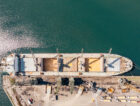
Faced with an escalation in both domestic and international volatilities, Turkish businesses are facing a double hit of uncertainty. A struggling lira is providing a boost to exports, but at the same time increasing the cost of foreign financing. Aleya Begum reports.
For businesses operating in Turkey, the past half year or so has been testing in almost every arena. On the domestic front, they face constitutional reform in a stalled economy that is weighed down by terror attacks, wide-ranging measures of government clampdown following an attempted coup, and an expansionary monetary policy. This in turn has brought about a weakening local currency, which has subsequently led to international investors and financiers pulling away from Turkish investments or hiking up their lending rates.
Throw in a slow global economy and shifting political scenarios in which it is not yet clear where Turkey might stand, and the struggle of Turkish businesses and exporters becomes very apparent.
Domestic disturbances
For the decade leading up to 2012, Turkey’s performance was impressive: successful macroeconomic and fiscal policy created stability, increased employment and incomes, and pushed the country to the World Bank’s upper-middle income country band. The country saw dramatic urbanisation and opened up to foreign trade and finance as well as harmonising itself with many European Union laws and regulations.
Just a few years later, Turkey is very different. The war in neighbouring Syria, an insurgency of Kurdish areas in the east of the country, and an attempted coup last July, have caused a dramatic crackdown by the government across all areas of society. The incumbent Justice and Development Party (AKP), currently ruling by decree under a state of emergency, is now pushing for constitutional reform that will give President Recep Tayyip Erdogan broader powers as well as allow him to run for two more terms of office. Critics say this will pave the way for more authoritarian rule and further undermine democracy in the country.
For businesses, this has meant a challenging operational environment. Not only does the threat of terror attacks potentially disrupt supply chains and increase security risks to staff and goods, but government actions so far against individuals and organisations accused of dissent mean companies are also operating under a state of fear.
Tens of thousands of people across academia, the military, judiciary, police, media and private businesses have been dismissed or detained – many suspected of harbouring sympathies for Fethullah Gülen, a US-based preacher whose movement is accused of being behind the coup attempt, or the PKK, a Kurdish separatist organisation.
“Because of the clandestine nature of the given movement and its very many operatives in all walks of life, companies are uncertain whether the people they are dealing with are Gülenist or not,” Mena analyst at IHS Markit, Ege Seçkin, tells GTR.
“For that reason they are unwilling to hire. We have seen a hiring freeze take place in Turkey for several months now. Foreign companies are afraid of doing business in Turkey for fear of their local counterparts being labelled as Gülenist down the line. This is creating a lot of uncertainty and is negatively impacting investments, which in turn is stunting economic growth.”
Government measures have extended beyond arrests and dismissals, with some companies seeing assets seized or being completely taken over by officials. A high-profiled example of this is the Boydak Group – a Turkish conglomerate and furniture exporter who saw its chairman and numerous executives arrested and the company eventually handed over to a state body. So far the government says it has taken over more than 800 companies worth a combined US$10bn since last July.
“Turkish companies are focusing on sustainability, crisis management and looking to invest in different markets [outside Turkey]. Those who have the financial ability are trying to create balance,” says senior partner at Bener Law Office, Gözde Esen Sakar.
Foreign companies in Turkey are also feeling the squeeze. While they are not necessarily in the direct line of fire, there are implications for them too. In December last year, Germany’s ECE, a major shopping mall operator, was forced to end its management contract for a shopping centre in Istanbul. The centre, which only opened a few months prior, saw its owners accused of having links to the Gülen movement and subsequently had its assets confiscated. Since ECE was dependent on having an active landlord to sign store leases, it had to give up the location.
German media have reported on numerous struggles for companies operating in Turkey, where Germany is the largest foreign investor as well as its biggest export destination. Some 6,500 German companies operate in Turkey but the German Chamber of Industry and Commerce expects to see a 5% drop in trade volumes this year.
While the door may close for some, it is opening for others. According to Sakar, Bener has seen numerous foreign companies maintaining their position in Turkey and had new potential investors approaching them this year, interested in creating new joint ventures or supplying goods within energy and manufacturing in Turkey.
“There is a pending interest, no need to be pessimistic,” she says.
Currency crisis
In addition to the political crackdown, the government has embarked on an expansionary monetary policy, and is pushing for low interest rates to encourage growth, despite low central reserves.
This approach is coming at the cost of the central bank’s reputation for prudence and measured policies as analysts say the moves are largely seen as benefiting Erdogan’s own presidential agenda.
“He simply cannot afford an economic downturn at such a critical juncture. He knows that this is the one thing that will really impact on his popularity and the support for the new system,” says Seçkin. “These structural flaws – combined with political instability, security risks both at home and the near-abroad and populist economic policies – they start putting severe pressure on the value of the Turkish lira.”
Last year, the Turkish lira lost 20% of its value against the US dollar and fell a further 8% in the first weeks of 2017. The impact of the drop is, on the one hand, positive for exporting companies since it means Turkish products are a lot cheaper on foreign markets.
In addition, some of the larger exporting players have income from outside and their own internal FX deposits, making them less exposed to currency fluctuation.
“In Turkey we have big companies and contractors in export sectors like textiles, automotive and agriculture that have excess FX deposits – these companies are benefiting. You will see a jump in their profits, and increases in their capital,” says Bank ABC’s chief representative in Turkey, Muzaffer Aksoy.
On the other hand, however, Turkey’s manufacturing sector is dependent on imports of unfinished goods and raw materials. These imports are now rendered a lot more expensive and will impact on the balance sheets of even the major manufacturing conglomerates.
The question becomes at what point they will have to start pulling out, especially those without FX deposits, who will struggle to finance their debt.
Ratings agencies Standard and Poor’s and Moody’s downgraded the country’s credit rating to junk status last year and Fitch followed suit in February. Fitch said the plan to concentrate power in the office of the presidency would “entrench a system in which checks and balances have been eroded”.
Inevitably, all this has led to increases in the cost of finance but, with companies reluctant to borrow at higher prices, a stalemate situation has arisen.
“Because of the volatility, investors are freezing their investments. Foreigners are reluctant [to lend] to the Turkish market, but locals are also reluctant to borrow,” says Aksoy.
“That’s why [trade transaction] volumes are down. As a foreign bank you want to increase your rates – but Turkey does not want to pay a high rate so there are no buyers. There is a little bit of discrepancy in the market right now.”
The trend is evident across capital markets too, according to analytics and intelligence company Coalition. “You can see that the political turmoil has been hurting the capital market and trade flows of this country tremendously. We’re looking at a macro hit across every single sector,” says research director Eric Li.
In a bid to boost the lira, Erdogan announced in December that he will be taking steps to launch state tenders in the local currency and called on Turks to cash in their foreign exchange holdings to buy the lira instead. A lot of business deals in Turkey are conducted in foreign currencies, such as the dollar or euro, making it easier for overseas companies to take part. Even at household level, a lot of property is sold or rented in foreign currency.
Turkey’s own banking system, however, remains strong with low non-performing loans ratios and high capital adequacy ratios. Companies are expected to have no problems borrowing locally thus deterring any big bankruptcies or defaults. But with government pressure to accelerate credit growth through lower loan rates, this could cut margins and hinder future revenues and capital availability at home too.
International relationship shifts
On the global front, like the rest of the world, Turkey is faced with sluggish demand from its western trading partners. Europe, its largest export region, is critical of Turkey’s human rights violations and post-coup crackdown, and the Union’s criticism has been followed by threats from Erdogan to allow refugees through to Europe, despite receiving EU grants to care for them in Turkey. The relationship reached a critical point in November when EU political group leaders argued that Turkey was heading towards a constitutional reform that was not compliant with EU values and principles and voted on a freeze to accession talks.
“They [relations with the EU] are in the worst state they have ever been and that’s a result of the deterioration of the rule of law and the deterioration of democratic practices by Turkey,” says Seçkin.
“Things would probably be in a much worse state had it not been for the refugee crisis, which is keeping the relationship afloat because of pragmatic concerns. From Erdogan’s perspective it is very clear that the EU membership ambition is no longer there, but they don’t want to end the relationship as of yet because of the impact it will have on the economy and on trade.”
The UK referendum to leave the EU adds another dimension to Turkey’s ties with Europe. On the hunt for trade deals, UK prime minister Theresa May recently agreed on a £100mn deal to develop Turkish fighter jets involving BAE Systems and Turkish Aerospace Systems. Commenting on the deal she said: “It marks the start of a new and deeper trading relationship with Turkey.” May’s move clearly undermines the EU’s position and its efforts to use trade as a negotiating tool to bring Turkey more in line with EU standards.
Meanwhile, across the Atlantic, the election of US President Donald Trump has raised more questions for Turkey. While Trump personally is known to have done a lot of business in Turkey, the ministerial portfolio of his cabinet holds contradicting views. While some are seen as advocates, others such as Steve Bannon, who has a focus on anti-Islamism, could try to steer policy in a more antagonistic direction.
The shift away from the West has seen Turkey bolster its efforts with Russia and the Middle East. The relationship with Russia had soured after Turkey shot down a Russian plane over the Turkey-Syria border in November 2015. However, following the attempted coup, Erdogan made it a priority to reach out to the Russians, and the two are now co-operating in Syria, helping Turkey to counteract the spread of Kurdish forces along its border.
Turkey imports a sizeable chunk of its hydrocarbon needs from Russia, and with energy being one of the country’s biggest imports, the renewed relationship brings with it a hope to secure cheaper energy supplies for the country. In February, Russian President Vladimir Putin ratified the Turkstream project which will see over 30 billion cubic metres of gas per year heading to Turkey via the Black Sea, half of which will be for domestic use. Construction is expected to start this year with completion aimed for 2019.
Turkey has also been pushing for trade agreements with its Arab neighbours. Towards the end of last year, the Union of Chambers and Commodity Exchanges of Turkey (TOBB) said it is establishing a Turkish-Arab Chamber, which will see Turkey establish a business relationship with 22 economies within the Arab region. It has also extended its Gulf Co-operation Council (GCC)-Turkey Joint Action Plan until the end of 2018. The plan encourages co-operation between member countries in energy, trade and investment as well as health, culture and education.
Rough road ahead
The road ahead for businesses operating in Turkey is bumpy. If Erdogan is successful in the upcoming presidential election, the result could be good in terms of offering more stability and clarity surrounding government institutions and where power resides. Supporters of the reforms say a strong executive, often compared by pro-government backers to the system in France or the US, will help in preventing fractious coalition governments. They point to the instability that this causes as the reason why Turkey was driven to deep recession in the 1990s.
However, critics argue it will just consolidate what is an existing trend of mismanagement in the Turkish government and that there will be a continuation in expansionist and populist policies.











